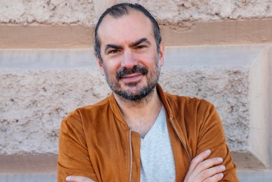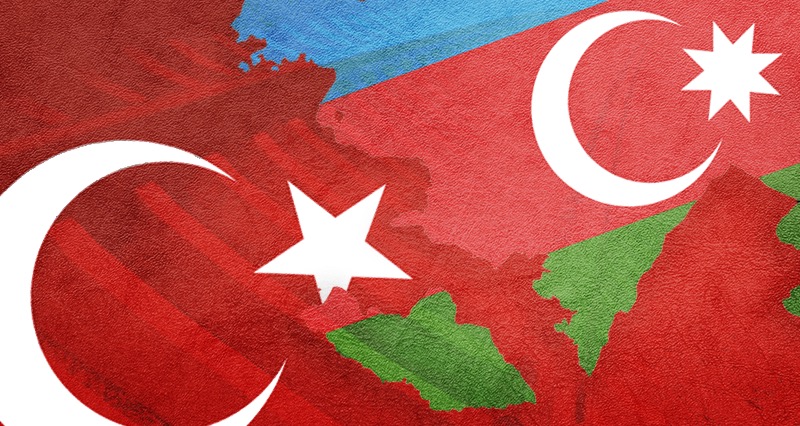By Sabina Alizade
In an interview with TGRT Haber, Turkish Minister of Transport and Infrastructure Abdulkadir Uraloğlu confirmed plans to start the construction of this railway line by the end of this year, stating that the project will be completed within five years.
A tender for the construction of the 224-kilometre railway was announced earlier this year, and negotiations regarding the financing of this large-scale project are currently underway. The Turkish transport minister emphasized that the construction of this line will be crucial for the operation of the Zangezur corridor. Work is planned to start from Kars to the Dilucu border crossing, where the corridor intersects with the Azerbaijan border. The expected completion time for this section is approximately five years.
Additionally, the construction of a railway section between the Nakhchivan Autonomous Republic and Zangilan is also planned for the coming years. Uraloğlu stressed the importance of completing railway construction in the regions of Azerbaijan liberated from occupation and modernizing the railways in Nakhchivan.
The transport corridor is expected to become fully operational in 2028-2029. This route will have strategic and economic significance for Türkiye and the entire region. The importance of the Zangezur corridor for global trade has increased, particularly in the context of risks related to events in the Suez Canal and the Red Sea. The opening of the corridor will create a significant new alternative for economic relations between Asia and Europe.
Although the current plan envisions a corridor passing through eastern Türkiye and Nakhchivan, the possibility of the route passing through Iran is also not excluded. Azerbaijan is negotiating with Iran on this issue, but a final decision on the route has not yet been made. At the same time, the possibility of constructing sections of the corridor through Iran and Armenia should not be ruled out.

In an interview with us, Turkish historian, political expert and United World International author Mehmet Perinçek noted that a new era has begun in the South Caucasus after Azerbaijan restored its territorial integrity. He stated that there was no basis for development, integration, and cooperation in the region until now. The liberation of Azerbaijani territory from occupation created a new favourable situation for the entire region, including Armenia.
“Social and economic problems can only be solved through friendly and neighbourly relations and cooperation between regional countries – Azerbaijan, Türkiye, Russia, and Iran. The period of regional integration that has begun creates very positive conditions for Armenia. Among these regional projects is the opening of the Zangezur corridor. The opening of the Zangezur corridor was already planned in the trilateral agreement. This corridor is now becoming more of a reality. The Zangezur corridor is a project that connects the Turkic world, a route that starts from Türkiye, continues through Nakhchivan, reaches Azerbaijan, and extends to Central Asia. Türkiye plays a role in connecting the Turkic republics of Central Asian through Azerbaijan. This is undoubtedly a great opportunity for the Turkic world. However, this project is not only for the Turkic world, Türkiye, and Azerbaijan,” he said.
The expert emphasized that the Zangezur corridor will yield positive results for all the countries in the region. He noted that the expansion of transport routes and the opening of a new transport route are especially important for Russia, which is under sanctions.
“This will bring regional integration, regional development, and regional stability. Regional stability also means the southern borders of Russia. The peace environment, development environment, and regional integration created by the Zangezur corridor are important for the security of the southern borders. This will be an important step in ensuring the security of Russia’s southern borders,” he added.
Türkiye and Azerbaijan, along with Armenia, have the potential to solve their regional economic problems, regional development projects, and regional integration projects.
“Moreover, the development of trade relations with Russia, the opening of new transport and trade routes, and the passage of this route through Armenian territory will also have significant value for Armenia’s economic development. Iran had certain concerns about this issue. However, these concerns were eliminated through Azerbaijan’s rational policy. This also shows us that a common solution was found between the two countries. Iran and Azerbaijan have agreed on the Zangezur corridor, taking into account Iran’s specific interests. From this perspective, the Zangezur corridor shows that it is not only a matter for the Turkic world, Azerbaijan, and Türkiye but also for all the regional states, including Iran, Russia, and Armenia. It should also be noted that the integration of the Turkic world is not against any regional country. Today, the unity of the Turkic world is not a union against China, Russia, India, and Iran. On the contrary, it is part of and complements broader Eurasian integration. As the Turkic world comes together, it becomes easier and strengthens the unification of the Eurasian countries. Therefore, I believe that the Zangezur corridor unites the Turkic world,” he emphasized.
Perinçek stated that the West, especially the US and France, are not pleased with these developments. He noted that after Azerbaijan restored its territorial integrity, the US and France lost their means of intervention in the South Caucasus.
With Azerbaijan’s victory and the initiatives developed by regional countries, particularly Türkiye and Russia, their plans to plunge the region into chaos were thwarted. Therefore, Western imperialist states feel uneasy. The Zangezur corridor further amplifies this. As regional countries solve their problems, come together, achieve economic development, and cultural and social integration, the West will have no means to intervene in the region. From this perspective, especially the US and France support Armenia and continue to provoke the Yerevan government against regional countries. They aim to create chaos and conflict and find tools to intervene in the region again by exploiting the environment of chaos and conflict. From this perspective, the Zangezur corridor project undermines the plans of the West, especially France and the US, regarding the region. Stability and peace in the region nullify the West’s negative and dirty plans, and the regional countries have demonstrated this clearly.
“When the intervention of Western countries in the region is prevented and regional countries take the initiative, they have shown that there is no problem they cannot solve. They even indicated the possibility of signing peace between Armenia and Azerbaijan. Iran’s doubts about the Zangezur corridor have been eliminated. We have seen that when sitting around the table without the intervention and influence of other states, there is no problem that cannot be solved. This is important for the further development and consolidation of the Zangezur corridor and its sustainability. There is also a very important platform for the region. The 3+3 platform should be further developed and made functional. Georgia must be included in the 3+3 South Caucasus platform. If this is achieved, the Zangezur corridor will become much more functional and will create opportunities for the welfare and development of all the countries in the region. This will create an appropriate ground and platform to eliminate any questions in the minds of any country, and both the Zangezur corridor and the 3+3 platform will ensure the peace environment, economic integration, and regional development of the South Caucasus,” he said in conclusion.

Professor Elshad Mammadov, economics expert and doctor of economics, stated in an interview with us that the sustainable operation of the Zangezur corridor will depend primarily on the economic policies of regional states and the level of development of their economic relations with each other.
“Because ultimately, the priority of regional economic cooperation is becoming apparent. The process of breaking global transport and logistics chains is ongoing, and I do not think that the implementation of the Zangezur corridor is primarily important from the perspective of connecting Europe with our region. I believe that the Zangezur corridor can be considered a priority mainly for the economic relations of the regional states – Türkiye, Azerbaijan, Iran, Armenia, Russia, Georgia, and Central Asian countries, as well as for improving and expanding their economic policies,” he said.
“It is no coincidence that I mentioned states that are not located on the corridor. Because the implementation of this corridor is important not only for the states located on the corridor but also for all the countries in our region. The implementation of this corridor is expected to provide overall support for the economic development of the region, which is important for our entire region. But I would like to emphasize once again that in order to achieve this, positive results in the economic policies and the development of the production sector in regional countries must be achieved so that this corridor is used primarily for the transportation of products manufactured in the region,” the expert added.
Regarding what this corridor promises for Türkiye, the expert stated that if the appropriate economic policy is implemented, everyone in the region will reap the dividends from this corridor.
“At the same time, if we analyse the economic situation in Türkiye, we can indeed observe serious problems in the country’s economy. Türkiye has long been critically dependent on foreign markets and export markets. Therefore, export markets are very important for Türkiye. Today, access to European markets and problems with purchasing power in European markets make other markets important for Türkiye as well. I believe that through this corridor, Türkiye can gain significant access to the post-Soviet region, which is very important for the Turkish economy,” he said.
Mammadov also noted that not only the states located on the corridor but also other countries can reap dividends from the Zangezur corridor. He emphasized that the same applies to the regions of Azerbaijan.
“We can predict that with the realization of the Zangezur corridor, not only the regions located on the corridor but also other regions of our country will gain economic dividends. This should lead to overall economic revitalization. At the same time, I believe that the Zangezur corridor should have a stimulating effect on solving both economic and social issues, creating jobs, and forming high added-value production in the liberated territories. All this should undoubtedly give a positive impetus to the social and economic development of our liberated territories,” he pointed out.
The expert believes that the creation of social, economic, and humanitarian infrastructure is one of the most important issues for the liberated territories in the short and medium term.
“This is not just about creating new jobs or putting production facilities into operation, which is also essential. It seems impossible to ensure economic growth and development without this in our country. But at the same time, I believe that appropriate humanitarian and social infrastructure should also be created in those areas so that people can fully establish their activities there. From this perspective, I think this corridor should serve as an impulse that stimulates social, humanitarian, and intellectual, and naturally economic development in the region, because even the production of high-quality products in sufficient volumes does not mean social and humanitarian revitalization in the region. A systematic development impulse should be given to the region, and I believe that the Zangezur corridor can provide this positive impulse,” the expert added.
The article was initially published here.

















Leave a Reply